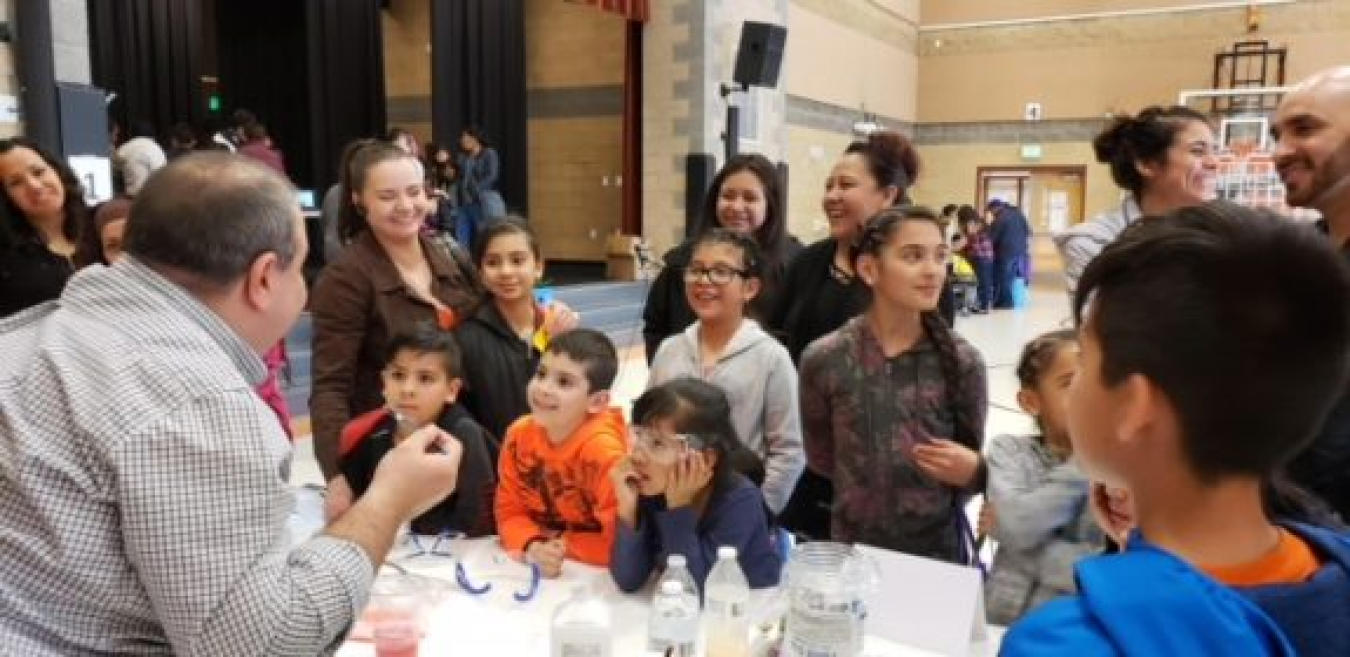INL provided a grant and Spanish-speaking volunteers to support the Dora Erickson Elementary School’s STEM education night.
June 7, 2019
Editor's note: this article was originally posted on Idaho National Laboratory's website.
What do strawberries, potatoes, and rockets have in common? They were all in use at Dora Erickson Elementary School’s STEM education night on April 26. INL provided a grant and several eager volunteers to one of Erickson’s after-school programs to help students who speak Spanish as their first language learn more about the possibilities in STEM.
“It’s really important to show inclusiveness to these kids,” said Dr. Lorenzo Vega-Montoto, a Chemical and Radiation Measurements staff scientist who was in charge of rallying INL employees for the event. “This community night was valuable because it was a bilingual event, featuring scientists of multiple ages and from multiple countries.”
Ines Guenther, School District 91’s English Language Academic Programs facilitator, applied for a grant to get INL involved with Dora Erickson’s after-school program for students with English as a second language. The program itself involves 30 kids, but all of their siblings and parents were invited as well, leading to over 100 attendees. The grant went to providing after-school program students with take-home science kits, so they could continue learning about and enjoying STEM activities long after the event ended.
“We have had other STEM nights, but often, the parents were busy, and in a rush to leave,” Guenther explained. “But at this event, everyone was so engaged and excited. Usually at these community nights, we have interpreters, but this is the first one where everyone involved was able to speak the participants’ first language. It was very meaningful to the families to have the scientists speaking directly to them, in Spanish.”
Vega-Montoto found Spanish-speaking scientists from INL to conduct demonstrations for the students and teach them about STEM projects. The researchers in attendance, along with Vega-Montoto, were engineers Daniel Chaita and Sergio Hernandez, Dr. Carlos Quiroz, and Dr. Luis Alejandro Diaz-Aldana. The projects included extracting DNA from strawberries, powering paper rockets with small solar panels, and learning how to produce electricity from potatoes – which Vega-Montoto and the students fondly referred to as “Idaho Potato Power!”

One of the most rewarding things for both Guenther and Vega-Montoto was hearing from students and parents about the ways this event impacted them. As Guenther said: “One father, who had been studying chemistry in Mexico, approached Lorenzo after the event to express his gratitude. Although he hadn’t been able to pursue his passion for chemistry after moving to the United States, his daughter now aspires to be a chemist! Another student told me that instead of being a tour guide, she now wants to be a scientist.”
The event taught these young students that they are capable of anything, and educated them about the possibilities available in the sciences right here at home. Seeing role models who spoke their language share stories of working in STEM has helped empower these children and encourage them to continue pursuing academic interests. The researchers also shared stories about moving to the U.S. from their home countries and related to the participating families on a personal level, allowing the students to better visualize themselves achieving great success in scientific careers. All the scientists from INL volunteered their time and materials to the project, so the grant could go exclusively toward continuing educational resources for the students. Vega-Montoto and Guenther are excited to keep working together to inspire Spanish-speaking students in the community.
Vega-Montoto made sure to emphasize the high percentage of women working in sciences at INL and that STEM options and aspirations are not limited by gender.
In his words: “Not only do these kids now see INL as an opportunity for a strong STEM career here in their hometown, but they saw through this STEM community night that their gender and skin color don’t matter, and that it doesn’t matter where they were born, what language they speak, if they have an accent or not. They learned that the sky is the limit, and if they work hard, they can achieve anything.”

